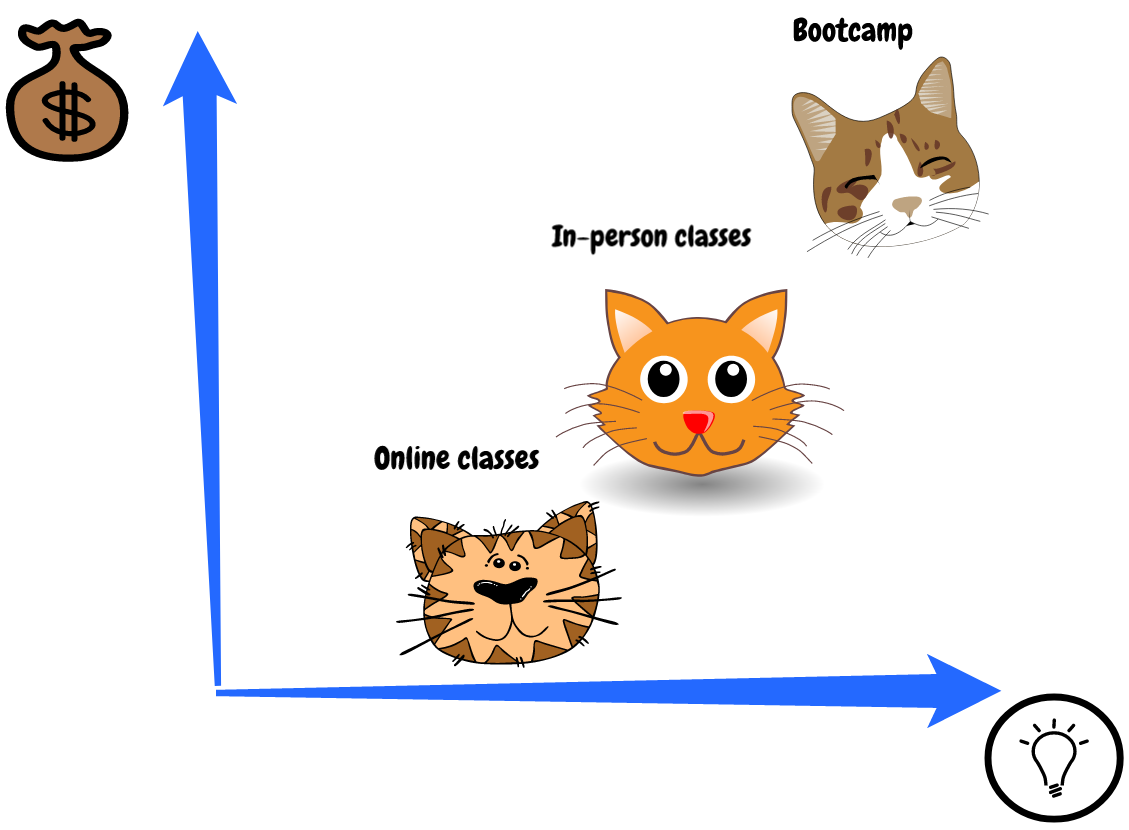Rambling on How to Become a Data Scientist. My 5 Cents
Part 1. Educational Background
September 12th, 2021

You decided to become a Data Scientist. Now what?
Over the last few weeks, I saw posts on social media and had conversations with aspiring data scientists interested in pursuing a career in Analytics or Data Science. I wanted to write a post about how to get into Data Science from a perspective of a hiring manager but also share what I learned from my experience as a Data Scientist.
This will be a series of 3 posts. In this post, I will talk about what an "ideal" educational background looks like and what to do when you don't have one.
In the next article, I'll deep dive into skills every data scientist should have. I'll also provide an overview of common data science tools and how proficient you should be with them.
In the last post, I will share examples of data sources that you can use to build your data science portfolio.
Educational Background
Educational background is almost always listed as a requirement in data science postings. I did a quick search of Data Science job postings, and saw that typically a degree in Computer Science, Statistics, Math or Economics dominated the postings I checked.
There were a couple of companies that also mentioned a Data Science and Analytics degrees. My guess is that these two aren't listed as often because until a few years ago you couldn't find a university offering a data science program.
In my opinion, you are equally likely to land a data science job with having any of these degrees. Even greater news is that your educational background provided you a solid foundation to pursue a data science career since you probably know how to program and are familiar with various Statistics concepts.
Having an actuarial background can also open up data science doors especially in the insurance industry.
If you have a degree in other areas, you may have to learn a few additional things, but it's totally doable to land a data science job with no relevant educational background! I've seen people switching from all sorts of non-technical disciplines to web development/software development and data science. If they can do it, so can you!
Below are most common pathways to acquiring a data science foundation that don't depend on your educational background.
 Cost vs Supervision/Accountability Trade-off
Cost vs Supervision/Accountability Trade-off
Bootcamp
This option would be most comparable to getting a university degree in a data science related area. Quite a few Data Science bootcamps are even offered by universities. They can take up to 6 months to complete, and some have 9-5 schedule which may not work for you if you have a full-time job, but a lot can be pursued part time.
Most bootcamps cover all key data science concepts, such as programming, modeling methodologies, data manipulation, big data, databases, and others. Another advantage of a bootcamp is that you get to learn with classmates and have an instructor who can help you in your data science journey. Many bootcamps also have career services that can help you with building a resume, interviewing and job search.
Bootcamps take less time than a university degree and can be recognized by employers as sufficient educational background.
Bootcamps can be costly; although with some providers, you don't have to pay much up front and can pay later once you successfully get a data scientist job. Bootcamps are, however, cheaper than a university degree. They take less time and can be recognized by employers as sufficient educational background.
Another option is pursuing a certificate program. Most of these programs target people who have an undergraduate degree and are interested in pursuing a master's degree but may not have time or aren't willing to pay the full cost of a master's program. Certificate programs typically require taking core courses which should provide a sufficient foundation and can be counted towards a master's degree if you decide to take it further.
Check with your local universities about a bootcamp or certificate program.
How do you find a bootcamp or certificate program? I recommend checking with your local universities. It may make you more marketable if you have a university name associated with a bootcamp or certificate. You can also search for organizations that offer bootcamps.
Make sure to check the syllabus! Which technical skills does the program focus on? Do they provide a proper programming introduction or do they only focus on applications in data science and analytics? Is there a capstone that you need to successfully complete? If not, that would be a major red flag for me. Are any career services offered to students? Make sure to check reviews and even better talk to people who completed these programs (try finding them on LinkedIn). Bootcamps or certificate programs are a significant investment into your future, so make sure to do your research.
In-person/remote classes
If you can't afford a bootcamp or certificate program, but prefer in-person experience. Your can check if universities or other learning organizations that offer bootcamps, also offer in-person classes.
Another option is to take undergraduate classes form a local university without pursuing a degree. I would be surprised if a data science program allowed you to take a class (they are typically more expensive), but Statistics or Computer Science programs may.
I haven't taken any in-person Data Science courses, but I took a Web Development and JavaScript evening courses. To me, it was easier to learn something I wasn't familiar with in an in-person environment and having an instructor to answer my questions.
Online courses
What if there are no good programs near you or you want to minimize your spending? Your next option is online courses. This option will require more time on your end with you being responsible for figuring out what to learn, how to learn and when. This may be intimidating as there are tons of courses, books, blogs, YouTube channels, etc. available.
When taking online courses, start with creating a plan and try to find someone who can keep you accountable, like a study partner or a mentor.
Start with creating a plan of which courses to start with, how many hours to spend every week on studying, and try to stick to the schedule. If you can, find someone who may be interested in taking a course with you. This can help discussing concepts, solving problems and learning better. Alternatively, you can find a mentor who can keep you accountable. Keep in mind that taking one course would not be sufficient to pursue a data science career.
Here is a list of skills you should start building with the first three being the core skills and last two that are nice to have:
- Programming (Python, R, Julia)
- Data Manipulation (SQL or SQL-like skills)
- Data Science Concepts and Models
- Big Data
- Model Ops
Here is a list of courses that I would suggest looking into that should be enough to get you started. I'm a bit more biased towards Coursera and Udacity which you will see here, but I also recently discovered edX that has a variety of great courses.
- Programming in Python (Udacity)
- Python for Data Science (Coursera)
- Data Science Specialization (Coursera R)
- Mathematics for Machine Learning (Coursera)
- Machine Learning
- Deep Learning (Coursera)
- Intro to AI with Python (CS50 Harvard series)
In addition to online courses, I would also suggest reading a couple of books.
- Python Programming (Free, Beginner) A really good starting place for learning python for an absolute beginner.
- Fluent Python (Intermediate)
- The Elements of Statistical Learning (R). Even if you don't want to learn R, the book covers core data science concepts and modeling methodology.
- Applied Predictive Modeling (R). This is one of my favorite books. When I want to refresh my knowledge of ML model, I typically refer to this book.
- Introduction to Machine Learning with Python. A good book for a Python user.
- Hands-on Machine Learning with Scikit-Learn, Keras, and TensorFlow
In the next post, I'll cover data science skills and tools in more details.
You May Also Like

